Providence Votes
Marcus Peabody
→ MFA GD 2019
On Election Day I visited a string of polling places in Providence—walking from the west side to the northern border with Pawtucket to the southern edge by Roger Williams Park. I’d been wanting to traverse the city where I live for a while, to witness its cultural, economic, and even architectural variations in one sweep. Election Day felt like the perfect day to do it. Not only would I have a ready-made itinerary, I figured I would find people ready to talk as I conducted a sort of anecdotal survey.
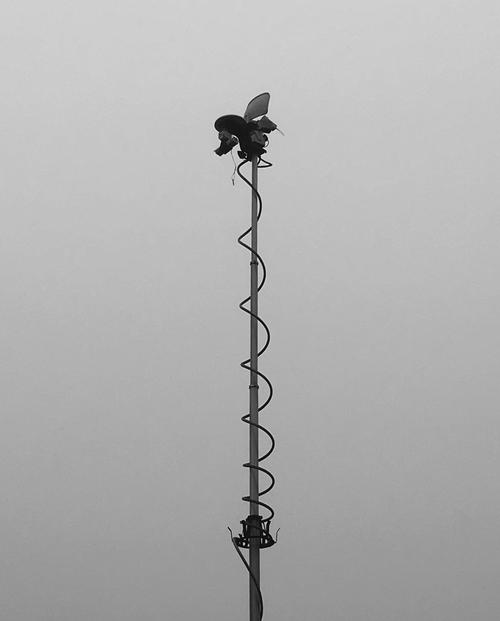
No public map of city polling places existed, so I made my own by systematically plugging zip codes into the Rhode Island Department of State website. The map took me to a variety of locations—a church, a hospital, a school, a theater—all temporarily transformed into the same thing: a place for residents to stop for a while and cast a ballot.
7:44 AM
First polling place. The Steel Yard is an industrial sculpture studio in the Valley neighborhood, down the road from a strip club. A huge corrugated iron barn door opens to four voting booths, tucked in around heavy, red, plastic welding screens. But there’s a problem: the only ballot machine is down. Voters are being turned away. Voters are angry.
Susan, the moderator, claims that only 12 people failed to vote before service was restored at 7:45. Susan: “We didn’t turn them away, we asked them to come back. It’s not a problem. We were a little slow booting up, but the technician is here now, and we’re up and running.”
8:24 AM
Up now past the Italian restaurants of Federal Hill to the second polling place: Parenti Villa, a public housing tower block. One machine, six voting booths, no problems. It’s a community affair: voters are hugging the moderators, who are joking back. The check-in desks are pushed right up to the room’s double doors, concentrating energy and citizens. Excitement fills the room as people cast their votes.
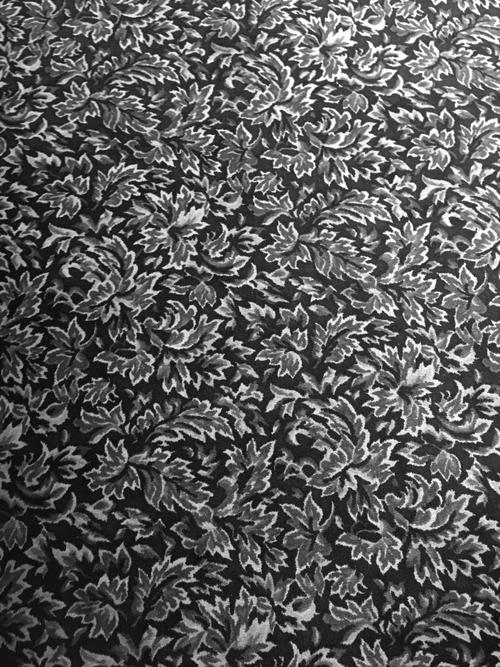
10:17 AM
Onto one of those new red bikes and north toward the Providence-Pawtucket line. Summit Common is a rehab hospital set behind a quiet residential street full of clapboard houses and fallen leaves. Ambulances idle in the carpark. Mothers are on the way out, their children proudly displaying I Votedstickers. An Iranian-American couple—college professors I happen to know—cast their ballots in the patients’ lounge. “Our civic duty,” they say. The carpet is autumnal, too. 12 booths, two machines.
10:59 AM
South along Hope Street. Quiet neighborhoods. More I Voted stickers, this time on Patagonia jackets coming out of Seven Stars bakery with takeaway cups. Allison is the election moderator at the Church of the Redeemer. “There have been lots of kids today … they come in waves … no problems, everything is running smoothly.” Six voting booths and one machine, this one tended by a technician who’d just arrived in a Jeep with government plates. He hovers over the poll workers, then, noticing me, barks at Allison: “What is he doing here? He doesn’t work here! He doesn’t need that information.” Allison, under her breath, to me: “Don’t get me started on him.”
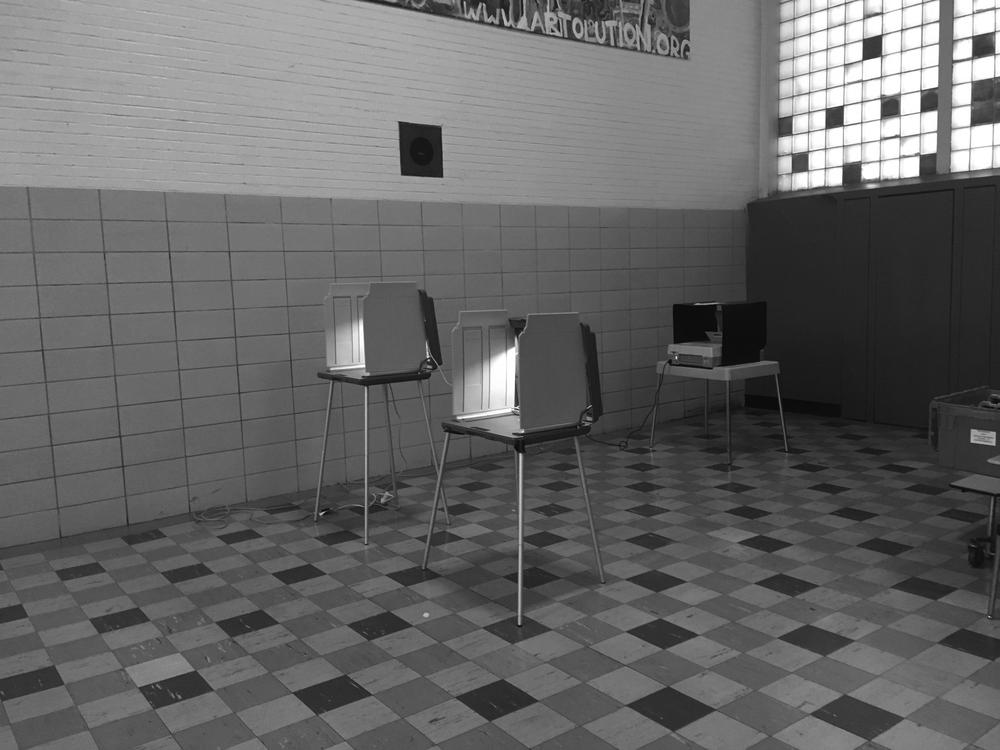
11:23 AM
Around the corner: Nathan Bishop Middle School. Julianne Lima, the put-together TV reporter for WPRI, talks to me from the back of the news truck outside. “We’ll try and catch all of the candidates voting, we’ll go the campaign headquarters later. The big story is What is turnout like?, Who is voting? Her dishevelled, talkative cameraman with a bluetooth earpiece: “The weather might be problematic later.”
Inside the school: 16 booths, two machines. A guide dog leads a blind person, a young woman helps an elderly woman to her booth, before standing respectfully back while she marks her ballot. “It’s done. Now we just pray … pray hard.” Candy is distributed to the waiting children.
11:50 AM
Further south along Hope Street, past a faded Obama cutout peering out of a window. The fog thickens and the clouds drop even more. Hope High School: 14 booths. Two years ago there was just one machine, and lines and complaints formed quickly. Now they have a second. Here only a few voters, and a handful of students assigned to work the event. A University of Rhode Island student from Central Falls conducts exit polls: “My professor has been doing this research for years… just standard exit poll questions.” A journalism student from Brown who is covering the election: “I hate talking to people … it’s so awkward.”
12:43 PM
Now onward to the Brown University campus, dense with students and college buildings. Votes are cast in the lobby of the Salomon Center. Students zip by to the lecture hall. Matt, the moderator: “Almost exclusively college students, 85% or so. … This machine jams but we make it work. … Like any government agency there are flaws, but things are much better.”
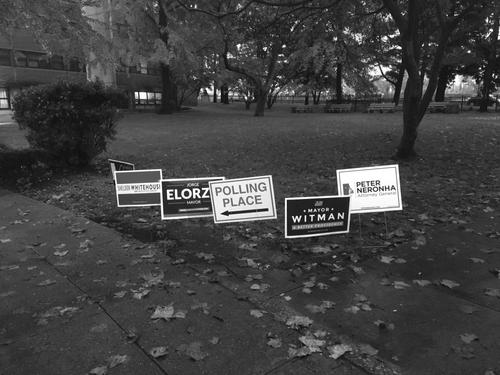
1:51 PM
Fox Point. It gets greyer and the rain starts to fall heavily. At the Vartan Gregorian Elementary School: two polling places, in two adjacent gymnasiums. First, the site for the Jewelry District, where Amanda presides over a tiny district: “We only have 348 people registered to vote here” (two booths, one machine). She makes no attempt to be impartial: “Everyone needs to vote. We need them. … Everyone is complaining about you know who, but they don’t vote!”
Next door (12 booths, one machine) serves ten times as many constituents. Rick, the warden, describes turnout: “We have more than the primary, so we’re doing better. Slightly fewer than a general. … I figured more people would come out at lunch.” A greeter at the door hears about my walk: “Everyone should take a walk in the rain. It’s peaceful.” His election service: “Seven years. I used to do it in DC before I moved here.”
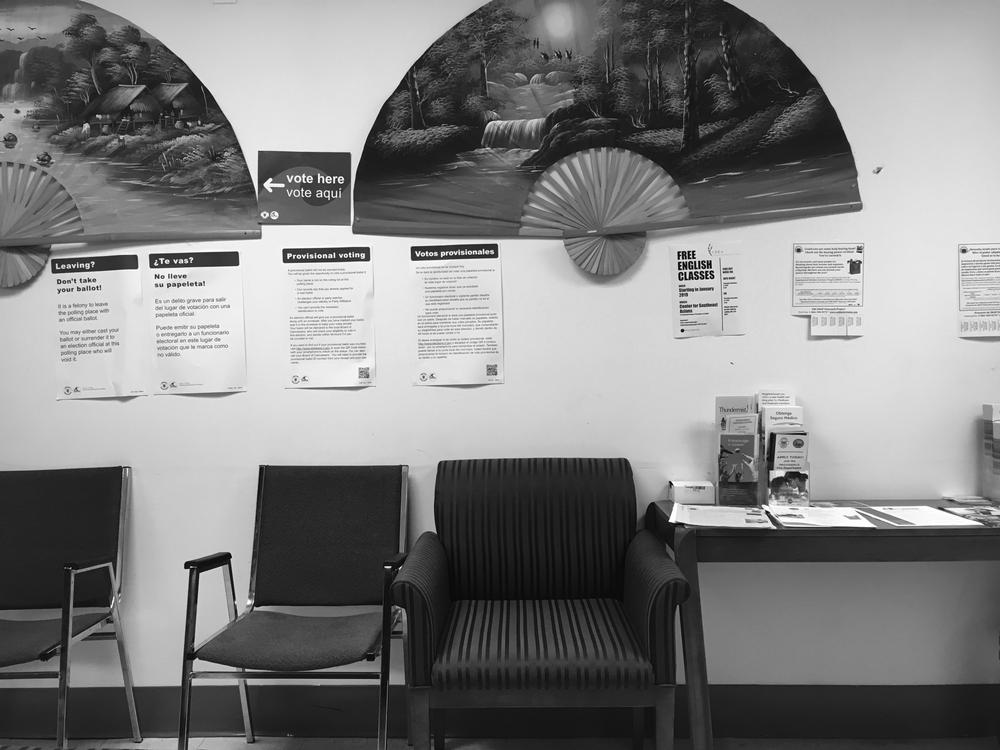
4:06 PM
The rain gets harder. Really driving now. My photo reflector becomes a makeshift umbrella. I jump on the 92 bus toward downtown, where people are leaving work.
350 people on the rolls at the Housing Authority. Linda: “The rush starts now!” 12 booths and one machine. Only Spanish is spoken in the hallways, which are papered with posters about government benefits and subsidy rights.
4:27 PM
Over the highway and along Broad Street. Pawnbrokers and Asian groceries. Fast food and a cemetery with tumbledown gravestones. The smallest polling place of the day: the Teatro ECAS. Paula, in a bright pink power suit, is the warden. Just two booths, one machine. “We only have 35 voters registered. We do the tower block down the road. We used to be in the building, but the new owners didn’t want us there. I recognize people now, so even when they get married I know to punch in the old name, and there they are.”

4:34 PM
Elmwood Community Center. 14 booths, two machines. Jeffrey Lemire, the Independent running for mayor, is out front under a yellow umbrella. He takes a dig at incumbent Elorza, before conceding, “I’m not going to win tonight, but I’m hoping that next time you run.”
5:13 PM
A detour to Mayor Elorza’s headquarters, a steamy storefront on Broad Street. This race is close, so it’s a hive of activity with just a few hours until the polls close. The walls are papered with the public voter rolls, and volunteers are poring over them, making phone calls in three languages, striking off confirmed voters. Angel, the campaign manager: “We’re excited but we’re nervous.” Paella is offered. A volunteer making phone calls: “We’re worried about the weather. We’re asking them to go vote now, and we’re offering them rides.”
5:32 PM
Around the corner to incumbent congressman David Cicilline’s campaign headquarters. This candidate’s lead is clearer, and consequently the mood calmer. Michelle, the campaign manager: “We’re still making calls. The rain is slowing things down, but we’re feeling good.” Red, white, and silver helium balloons are flying, and cake is already served.
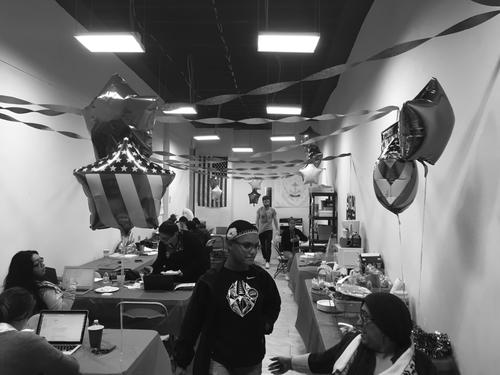
5:49 PM
The 14th and final stop for the night: a final cluster of election placards marks the Center for South-East Asians. Free English classes are advertised on the wall. Seven booths and one machine. Gloria searches for the English words to explain why it’s important to vote: “A lot of people need help.” A man caught hurrying out the door into the rain describes his hope for the next two years: “The same! Keep the economy going, keep jobs going … M.A.G.A!”
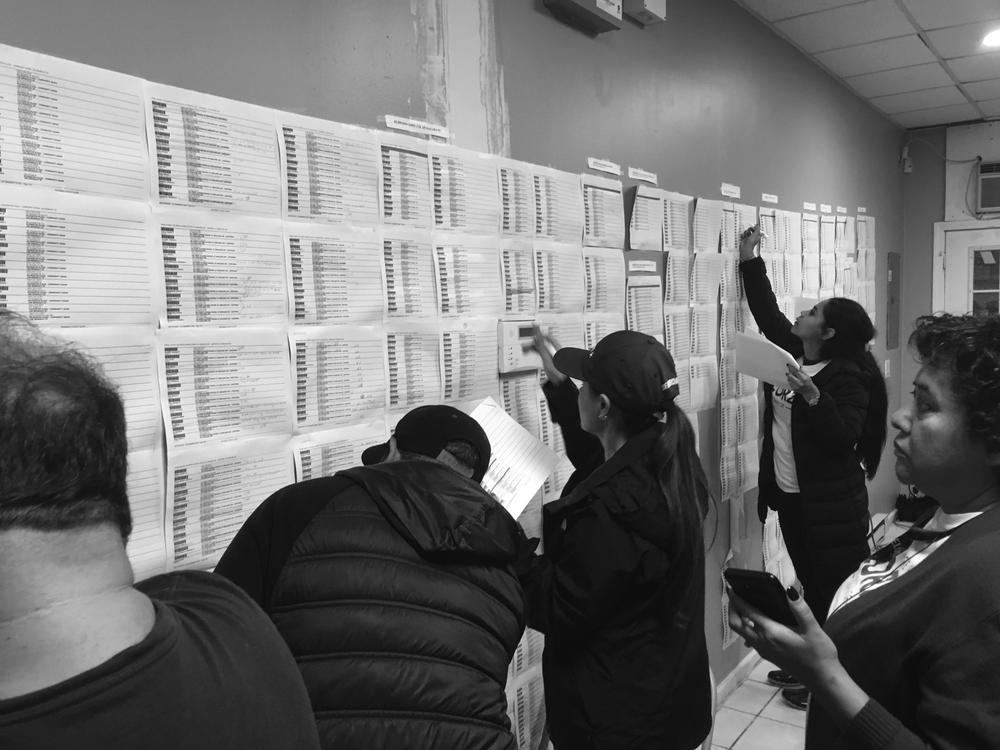
So that was my Election Day.
Things became more chaotic as I travelled south. The weather got steadily worse, and the energy went up as the polls got busier. In general though, things were surprisingly stable and consistent. Apart from the bickering of the poll workers and some inconsequential technical glitches, citizens passed through largely without a hitch.
It was a relief to see the democratic process mostly working: a mundane antidote to the maddening national political climate and news cycle.
Instead of confronting big national issues, I found myself looking carefully at the city that I had set out to examine. It was also heartening to see that in Providence the election was giving everyone an excuse to chat for a few minutes, in contrast to the divisive national politics. Things are relatively predictable here, with Democratic victory almost a foregone conclusion, but people still showed up and found a little common ground in a shared community activity.
Some names have been changed to protect the privacy of individuals.

No public map of city polling places existed, so I made my own by systematically plugging zip codes into the Rhode Island Department of State website. The map took me to a variety of locations—a church, a hospital, a school, a theater—all temporarily transformed into the same thing: a place for residents to stop for a while and cast a ballot.
7:44 AM
First polling place. The Steel Yard is an industrial sculpture studio in the Valley neighborhood, down the road from a strip club. A huge corrugated iron barn door opens to four voting booths, tucked in around heavy, red, plastic welding screens. But there’s a problem: the only ballot machine is down. Voters are being turned away. Voters are angry.
Susan, the moderator, claims that only 12 people failed to vote before service was restored at 7:45. Susan: “We didn’t turn them away, we asked them to come back. It’s not a problem. We were a little slow booting up, but the technician is here now, and we’re up and running.”
8:24 AM
Up now past the Italian restaurants of Federal Hill to the second polling place: Parenti Villa, a public housing tower block. One machine, six voting booths, no problems. It’s a community affair: voters are hugging the moderators, who are joking back. The check-in desks are pushed right up to the room’s double doors, concentrating energy and citizens. Excitement fills the room as people cast their votes.

10:17 AM
Onto one of those new red bikes and north toward the Providence-Pawtucket line. Summit Common is a rehab hospital set behind a quiet residential street full of clapboard houses and fallen leaves. Ambulances idle in the carpark. Mothers are on the way out, their children proudly displaying I Votedstickers. An Iranian-American couple—college professors I happen to know—cast their ballots in the patients’ lounge. “Our civic duty,” they say. The carpet is autumnal, too. 12 booths, two machines.
10:59 AM
South along Hope Street. Quiet neighborhoods. More I Voted stickers, this time on Patagonia jackets coming out of Seven Stars bakery with takeaway cups. Allison is the election moderator at the Church of the Redeemer. “There have been lots of kids today … they come in waves … no problems, everything is running smoothly.” Six voting booths and one machine, this one tended by a technician who’d just arrived in a Jeep with government plates. He hovers over the poll workers, then, noticing me, barks at Allison: “What is he doing here? He doesn’t work here! He doesn’t need that information.” Allison, under her breath, to me: “Don’t get me started on him.”

11:23 AM
Around the corner: Nathan Bishop Middle School. Julianne Lima, the put-together TV reporter for WPRI, talks to me from the back of the news truck outside. “We’ll try and catch all of the candidates voting, we’ll go the campaign headquarters later. The big story is What is turnout like?, Who is voting? Her dishevelled, talkative cameraman with a bluetooth earpiece: “The weather might be problematic later.”
Inside the school: 16 booths, two machines. A guide dog leads a blind person, a young woman helps an elderly woman to her booth, before standing respectfully back while she marks her ballot. “It’s done. Now we just pray … pray hard.” Candy is distributed to the waiting children.
11:50 AM
Further south along Hope Street, past a faded Obama cutout peering out of a window. The fog thickens and the clouds drop even more. Hope High School: 14 booths. Two years ago there was just one machine, and lines and complaints formed quickly. Now they have a second. Here only a few voters, and a handful of students assigned to work the event. A University of Rhode Island student from Central Falls conducts exit polls: “My professor has been doing this research for years… just standard exit poll questions.” A journalism student from Brown who is covering the election: “I hate talking to people … it’s so awkward.”
12:43 PM
Now onward to the Brown University campus, dense with students and college buildings. Votes are cast in the lobby of the Salomon Center. Students zip by to the lecture hall. Matt, the moderator: “Almost exclusively college students, 85% or so. … This machine jams but we make it work. … Like any government agency there are flaws, but things are much better.”

1:51 PM
Fox Point. It gets greyer and the rain starts to fall heavily. At the Vartan Gregorian Elementary School: two polling places, in two adjacent gymnasiums. First, the site for the Jewelry District, where Amanda presides over a tiny district: “We only have 348 people registered to vote here” (two booths, one machine). She makes no attempt to be impartial: “Everyone needs to vote. We need them. … Everyone is complaining about you know who, but they don’t vote!”
Next door (12 booths, one machine) serves ten times as many constituents. Rick, the warden, describes turnout: “We have more than the primary, so we’re doing better. Slightly fewer than a general. … I figured more people would come out at lunch.” A greeter at the door hears about my walk: “Everyone should take a walk in the rain. It’s peaceful.” His election service: “Seven years. I used to do it in DC before I moved here.”

4:06 PM
The rain gets harder. Really driving now. My photo reflector becomes a makeshift umbrella. I jump on the 92 bus toward downtown, where people are leaving work.
350 people on the rolls at the Housing Authority. Linda: “The rush starts now!” 12 booths and one machine. Only Spanish is spoken in the hallways, which are papered with posters about government benefits and subsidy rights.
4:27 PM
Over the highway and along Broad Street. Pawnbrokers and Asian groceries. Fast food and a cemetery with tumbledown gravestones. The smallest polling place of the day: the Teatro ECAS. Paula, in a bright pink power suit, is the warden. Just two booths, one machine. “We only have 35 voters registered. We do the tower block down the road. We used to be in the building, but the new owners didn’t want us there. I recognize people now, so even when they get married I know to punch in the old name, and there they are.”

4:34 PM
Elmwood Community Center. 14 booths, two machines. Jeffrey Lemire, the Independent running for mayor, is out front under a yellow umbrella. He takes a dig at incumbent Elorza, before conceding, “I’m not going to win tonight, but I’m hoping that next time you run.”
5:13 PM
A detour to Mayor Elorza’s headquarters, a steamy storefront on Broad Street. This race is close, so it’s a hive of activity with just a few hours until the polls close. The walls are papered with the public voter rolls, and volunteers are poring over them, making phone calls in three languages, striking off confirmed voters. Angel, the campaign manager: “We’re excited but we’re nervous.” Paella is offered. A volunteer making phone calls: “We’re worried about the weather. We’re asking them to go vote now, and we’re offering them rides.”
5:32 PM
Around the corner to incumbent congressman David Cicilline’s campaign headquarters. This candidate’s lead is clearer, and consequently the mood calmer. Michelle, the campaign manager: “We’re still making calls. The rain is slowing things down, but we’re feeling good.” Red, white, and silver helium balloons are flying, and cake is already served.

5:49 PM
The 14th and final stop for the night: a final cluster of election placards marks the Center for South-East Asians. Free English classes are advertised on the wall. Seven booths and one machine. Gloria searches for the English words to explain why it’s important to vote: “A lot of people need help.” A man caught hurrying out the door into the rain describes his hope for the next two years: “The same! Keep the economy going, keep jobs going … M.A.G.A!”

So that was my Election Day.
Things became more chaotic as I travelled south. The weather got steadily worse, and the energy went up as the polls got busier. In general though, things were surprisingly stable and consistent. Apart from the bickering of the poll workers and some inconsequential technical glitches, citizens passed through largely without a hitch.
It was a relief to see the democratic process mostly working: a mundane antidote to the maddening national political climate and news cycle.
Instead of confronting big national issues, I found myself looking carefully at the city that I had set out to examine. It was also heartening to see that in Providence the election was giving everyone an excuse to chat for a few minutes, in contrast to the divisive national politics. Things are relatively predictable here, with Democratic victory almost a foregone conclusion, but people still showed up and found a little common ground in a shared community activity.
Some names have been changed to protect the privacy of individuals.
Marcus Peabody is thinking his MFA thesis might be about the weather.